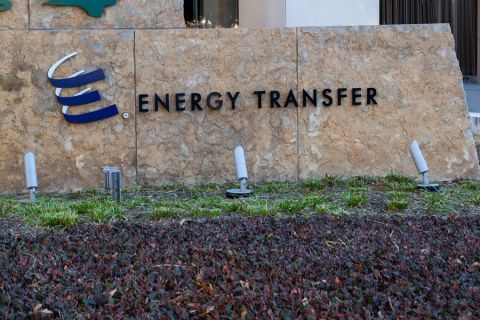Producers are more interested in reaching waterborne-oil-priced, coastal markets. Oneok Partners LP's withdrawal of its 1,300-mile, 200,000-barrel-per-day Bakken Crude Express pipeline plan from North Dakota to Cushing may reflect that --Producers want flexibility of rail, instead, in the markets they can reach, --Producers don't want to send their oil to the WTI-priced Cushing market, --The price of using the Oneok pipe wasn't competitive with the flexibility of rail or other pipeline plans and/or --More than enough pipe is already planned for Bakken take-away. These are suggestions from myriad U.S. E&P analysts upon the Oneok news this week. "We are not sure what the required terms were for the deal from Oneok," says David Tameron, senior E&P analyst for Wells Fargo Securities LLC. "But the price could have been a deciding factor. We have heard from some producers that they are hesitant to make long-term commitments at this point as options multiply and producers see sufficient capacity via existing and in-process pipe and rail. "As rail capacity continues to expand in the basin, providing access to additional markets outside of Cushing, we have seen refinery demand for Bakken crude stretch to the (East, West and Gulf) coasts, bringing along with it premium pricing." Analysts with Tudor, Pickering, Holt & Co. Securities Inc., report, "The abundance of rail is the likely culprit." They estimate there are some 750,000 barrels of daily oil-by-rail capacity currently, plus some 450,000 a day of pipe. Also, some 1 million of additional pipe capacity is expected to come online by year-end 2015, they add. Bernstein Research senior analyst David Vernon says, "Anecdotally, we understand producers are taking a wait-and-see approach in regards to shipping from the Bakken shale to Cushing, given the price differential between WTI-Cushing and (the coastal price). As such, it appears producers are reluctant to sign multi-year-approximately 10-year-pipeline contracts when railroads are offering flexibility of destination and one-, two- or three-year deals." In a report earlier in November, Vernon estimated U.S. oil carloads grew from fewer than 5,000 in first-quarter 2010 to nearly 90,000 in the second quarter of 2012. While rail provides producers with flexibility in the markets they can reach, he expects Bakken-by-rail will decline by 2014 as more pipe capacity comes online. "A valid question is if other pipelines are at risk," Vernon concludes. "We will be watching and asking industry contacts about other pipelines, though we suspect that one of the reasons the Oneok pipeline was cancelled was because there wasn't enough (Bakken) crude oil production to justify its completion. "Now it seems production and pipeline take-away capacity are better matched and, as such, we would expect the remaining pipelines to have a higher chance of being built." The WTI price-that is, the Cushing price-for oil has been less than the coastal price by $15 to $30 a barrel for most of the past 22 months. Estimates are that North Dakota currently gives up some 700,000 barrels a day and the figure is growing at great speed, while formations in addition to the Bakken are coming online. The play's founder, Continental Resources Inc., also proved the deeper Three Forks play to be a prolific oil producer. Since then, it has also proved the lower Three Forks II bench in 2011 with the Charlotte 2-22H that has made 87,000 barrels of oil equivalent (BOE) in its first 10 months. A second Three Forks II producer, ConocoPhillips' Sunline 11-1TF-2SH, has made 85,000 in six months. Continental is now drilling a first test of the yet-deeper Three Forks III zone with its Charlotte 3-22H. In accessing different markets, some of the company's roughly 62,500 BOE a day of Bakken production is now going via rail to a refinery on the West Coast at Anacortes, Washington. Bakken oil is also making its way to the East Coast, and more for that destination is planned. A day prior to the Oneok news, pipeline operator Enbridge Inc. announced a plan begin railing 80,000 Bakken and other barrels a day to a former coal-offloading terminal at Eddystone, Pennsylvania, south of Philadelphia. Two of a power-generation plant's six generation units there had operated on coal until they were retired in just the past 18 months, thus retiring the coal-offloading terminal; the balance of the power-gen units use natural gas as feedstock. Steve Wuori, Enbridge president, liquids pipelines, says of the rail plan, "Rail is the fastest way to provide increased export capacity out of the Bakken, creating a near-term solution to transportation bottlenecks and the resulting oil-pricing differentials. "Eddystone is an important step in our longer-term strategy to accommodate the anticipated growth of light crude-oil supply and to provide Bakken producers and PADD I (that is, U.S. Northeast) refiners with cost-effective capacity to premium markets on the eastern side of North America." -Nissa Darbonne, Editor-at-Large, Oil and Gas Investor, OilandGasInvestor.com, Oil and Gas Investor This Week, A&D Watch, A-Dcenter.com, UGcenter.com. Contact Nissa at ndarbonne@hartenergy.com. NOTE: For a full report on Bakken take-away to the East Coast and West Coast, in addition to the Gulf Coast, see "Tri-Coastal Bakken," December, Oil and Gas Investor, at OilandGasInvestor.com.
Recommended Reading
Enterprise’s SPOT Deepwater Port Struggles for Customers
2024-04-25 - Years of regulatory delays, a loss of commercial backers and slowing U.S. shale production has Enterprise Products Partners’ Sea Port Oil Terminal and rival projects without secured customers, energy industry executives say.
Report: Crescent Midstream Exploring $1.3B Sale
2024-04-23 - Sources say another company is considering $1.3B acquisition for Crescent Midstream’s facilities and pipelines focused on Louisiana and the Gulf of Mexico.
Energy Transfer Announces Cash Distribution on Series I Units
2024-04-22 - Energy Transfer’s distribution will be payable May 15 to Series I unitholders of record by May 1.
Balticconnector Gas Pipeline Back in Operation After Damage
2024-04-22 - The Balticconnector subsea gas link between Estonia and Finland was severely damaged in October, hurting energy security and raising alarm bells in the wider region.


